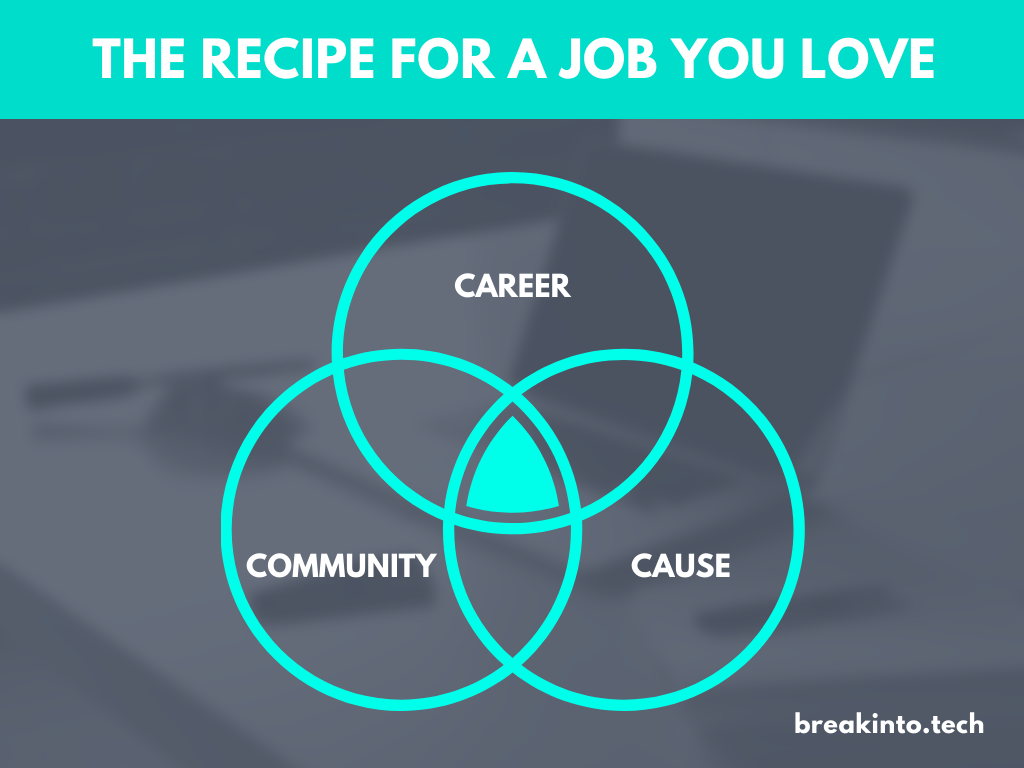You just spent a huge amount of time and energy finding a job that seems like it’s going to be great.
If you want to make sure it’s actually great, then be sure to invest just as much time and energy in the things that truly will make it so.
Step 1: Know What Matters
Congrats on your new role!
While it’s easy to dive into a new job and focus on all the little things (from “Where’s the bathroom?” to “How do I remember everyone’s name?”), don’t lose sight of why you found a new job in the first place:
Namely, to do work that fulfills you.
And so as you think about how to spend your time in the first 30 days, keep your eyes on the three “prizes” that research shows are most important to long-term job satisfaction:
Career - Work that gives you autonomy and a chance to take on big challenges
Community - Work that connects you to other people and makes you feel cared for and respected
Cause - Work that inspires you and feels meaningful
Step 2: Set Yourself up for Career Success
Let’s start with that first key factor: Career Satisfaction.
Because this is all about carving out some areas of autonomy, working hard to solve big challenges, and learning a ton a long the way, it makes sense to bring these questions up with your boss in your very first meeting.
Here are some ideas to get you started:
What are the most important goals for this role?
How will they be measured?
How much leeway do I have to pursue them?
What learning opportunities are available to help me achieve them?
By using the language of goals, you cut through all the noise of day-to-day work (meetings, email updates) and focus on what will actually bring you fulfillment over the long-term.
Plus, you can return to these goals in all your check-ins and keep a tight alignment between your objectives and those of your team and organization.
Want to have a fulfilling career? Regardless of what gets thrown your way, keep your eyes firmly on the goals that matter most.
Is space the only thing you share with your colleague? If so, you’re missing out on one of the key drivers of workplace happiness.
Step 3: Set Yourself Up for Community Success
Just as important as what you do all day is who you do it with.
So how do you set yourself up for social success?
Here are a couple things you can do from Day One:
Ask your boss to introduce you. In your very first chat, ask who your most important teammates and cross-functional partners are - and then prioritize investing in these relationships.
Fill up your lunch schedule. Everyone has to eat - and most people would prefer the company of someone awesome (i.e., you!). So don’t be afraid to schedule lunch chats with everyone you meet.
Find extracurricular activities. The toughest part of getting to know people at the office is that your whole relationship is tied to work. Go beyond this by meeting colleagues via work clubs (e.g., ultimate frisbee team) or volunteer activities.
Step 4: Set Yourself Up for Cause Success
Long after the new job honeymoon phase ends, you’ll still find meaning in your job if you’ve invested in a clear sense of the cause you’re pursuing.
To begin that investment in your first few weeks, here are a few tips:
Get to know your customers. No matter how far removed you are from the end user of your company’s product, you’ll find incredible motivation in getting to know the beneficiaries of your hard work. So be sure to join UX research sessions, customer service calls, and sales presentations to really understand who you’re serving.
Share your expertise with the community. Even if your customers don’t motivate you (e.g., serving Fortune 500 CIOs), chances are that your skills can also be meaningful to other audiences. For instance, if you’re in BizDev, can you organize a volunteer event where you teach NGO staff how to form new partnerships?
Define success for yourself. Your company may have a lofty vision statement that feels unattainable to you, personally. But try to translate that into a real change you can drive (e.g., “Organize the world’s information” -> “Help 100,000 searchers learn to identify fake news”) and then measure and celebrate your progress towards that personal goal.
How do you stay motivated long after new employee onboarding is over? Stay focused on what matters to you - whether it’s serving customers well or achieving a massive personal goal.















